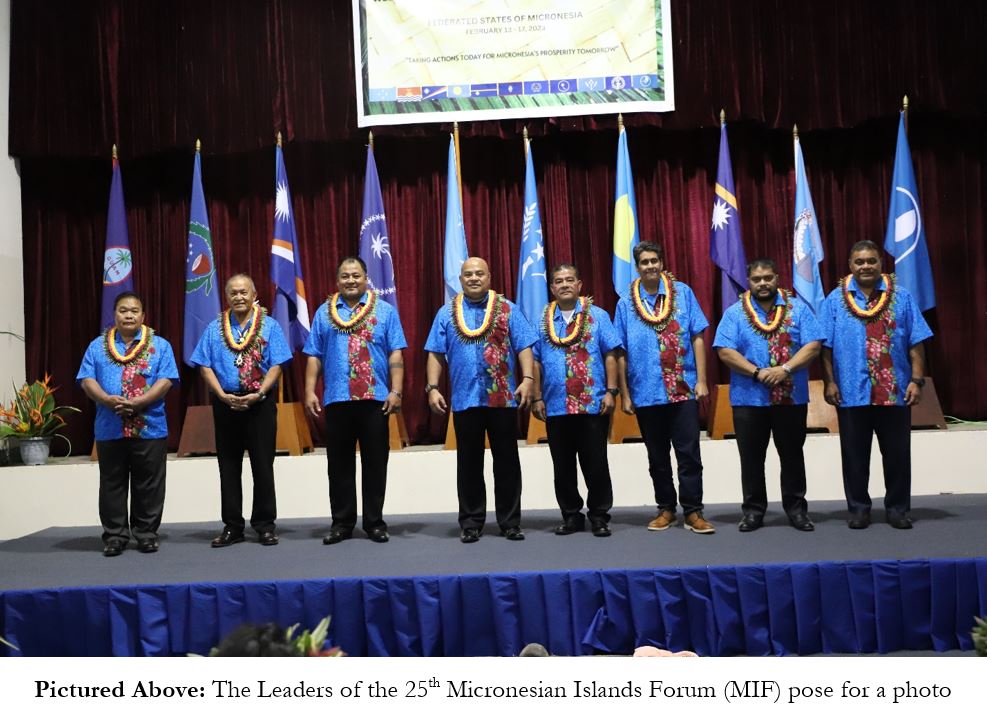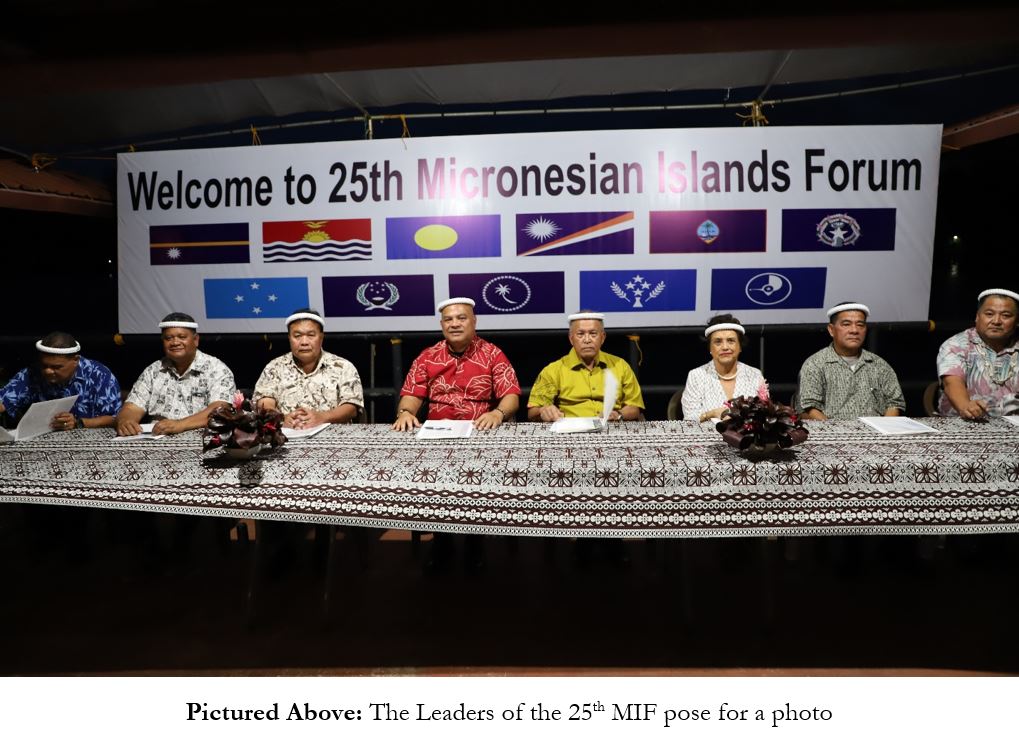

FSM Information Services
Press Release
25th MIF Takes Action Today for Micronesia’s Prosperity Tomorrow; Nauru Inducted into MIF
PALIKIR, Pohnpei—This February 2023, the 25th Micronesian Islands Forum (MIF) was recently hosted by the Government of the Federated States of Micronesia (FSM). Chaired by H.E. David W. Panuelo, President of the FSM, Leaders and representatives of the FSM and its states of Chuuk, Kosrae, Pohnpei, and Yap, the Commonwealth of the Northern Mariana Islands, the U.S. Territory of Guam, the Republic of the Marshall Islands, the Republic of Palau, and the Republic of Nauru, received reports and presentations on a number of issues of interest in the Micronesian subregion. Of particular note includes the Leaders welcoming the Republic of Nauru as the MIF’s 10th member; the Republic of Kiribati remains in receipt of an on-going invitation. This release will summarize some of the key outcomes from the meeting, but persons interested in reading the 25th MIF Communique may find it here: https://gov.fm/files/Joint%20Communiques/Joint_Communique_25th_MIF.pdf
Whereas the Micronesian Presidents’ Summit (MPS) is comprised exclusively of sovereign Micronesian countries, and by extension carries a heavy focus on subregional, regional, and international politics, the MIF includes subnational entities such as the FSM’s States and U.S.-affiliated Pacific Islands in the Micronesian subregion, and by extension carries a heavy focus on subregional environmental conservation efforts, trade, workforce development, etc.
The first Regional Committee to meet with the Leaders was the Micronesia Challenge (MC). Leaders were reminded of the original commitment in 2006 to effectively conserve at least 30% of the near-shore marine resources and 20% of terrestrial resources across Micronesia by 2020, which was successful, and of the new goal of effectively managing 50% of marine resources and 30% of terrestrial resources by 2030. MC reported that regional endowments currently totaled $16.1 Million of the target of $55 Million. Leaders agreed to institutionalize the MC Regional Office through the appointment of political focal points, to work with one another to jointly fund a $100,000 match to the Bill Raynor Micronesia Challenge Scholarship Fund; and to institutionalize the appropriation and funding of MC Regional Office dues.
The Regional Tourism Committee reported on the negative impacts of COVID-19 to regional tourism, including that the aftermath of the Pandemic represents an opportunity for Micronesian economics in their recovery. In this respect, Leaders agreed to expand participation in tri-annual meetings of National Tourism Organizations and State Tourism Organizations; to expand participation at Pacific Asia Travel Association (PATA) events; to support PATA Micronesia Chapter Initiatives including the conduction of training and seminars; taking action for each jurisdiction to join the Pacific tourism Organization; digitizing travel services at borders to be in line with international standards; and the continuous support and upgrade of facilities and attractions.
The Pacific Islands Regional Recycling Initiative Council (PIRRIC) reported on the cost of shipping recyclable materials off island, including non-existent exportation venues for non-recyclable plastic bottles. PIRRIC stressed the need for sustainable funding mechanisms for overall Solid Waste Management activities, including capacity building for all sectors of waste management activities. Leaders agreed to establish the PIRRIC Regional Coordinator Position in the MIF Secretariat; the containment and disposal of used oil in the region; and to establish a Marine Debris Program.
The Regional Health Committee reminded Leaders of Resolutions from the 24th MIF, including equitable access to comprehensive and quality healthcare services for Pacific Island veterans of the U.S. Armed Forces, and the strengthening of US-affiliated Pacific Islands health department capacities and systems to address the health security threat of Anti-Microbial Resistance (AMR), and the need for critical investments to occur in a number of health-related areas. In this respect, Leaders agreed to modernize and expand IT infrastructure to update existing Health Information Systems, disease detection, monitoring, and early warning systems; to expand the use of telehealth and telemedicine services; to strengthen ancillary services through a regional approach, including regional support for and use of Guam’s new planned Regional Public Health Laboratory Facility; and to reduce health disparities in remote areas and hard-to-reach communities.
The Regional Energy Committee described to Leaders the need to integrate Renewable Energy into Micronesian power systems, and stabilize power grids. Leaders agreed to enhance information sharing and partnerships amongst all member jurisdictions; to develop and support pilot Individual Power Products and Power Purchase Agreements in Renewable Energy; to expand capacity-building efforts in Renewable Energy; and to establish a Regional Energy Database.
The Regional Invasive Species Council described the outcomes of the first Pacific Ecological Security Conference held in Palau in October 2022, and the need to integrate invasive species efforts in Micronesia into the broader Pacific basin by collaborating with Australia, New Zealand, and others on programmatic and research efforts. Among other agreements, Leaders agreed to implement the outcomes of the first Pacific Ecological Security Conference; to recruit additional biosecurity officers in each jurisdiction; and to seek action by the USDA to fund and reinstate the annual Plant Protection & Quarantine biosecurity regional training program in 2023.
The Information Communication Technology Committee described that accessibility to services in unserved and underserved communities must be prioritized, and additionally recommended that there should be an MIF standard for submarine cable landing fees and licensing. Leaders agreed to ensure connectivity with capacity through all islands in the Micronesian subregion; to provide telecommunications accessibility to all residents; to pursue all means necessary to ensure reliable and resilient telecommunications services that are affordable for all; and to strengthen telecommunications security throughout the region.
The Regional Transportation Committee reported on air transportation issues in the North Pacific. Leaders agreed to liberalize air service resources to attract additional carriers; to foster an attractive and sustainable airline environment within each island jurisdiction; to encourage government subsidies to reduce travel costs; and to establish, where appropriate, multi-lateral and bilateral Air Service Agreements.
The Regional Workforce Development Council stressed the need for MIF jurisdictions to develop productive workforces, as well as the need to reduce barriers to employment. Leaders agreed to implement workforce development programs, including the FSM Skills Academy funded by the World Bank; to implement a collaborative apprenticeship program on a regional basis and in all jurisdictions; to support the revival and continued funding of the FSM Migrant Resource Center; and to conduct an economic survey to determine job demands, wage levels, and working conditions.
The Regional Education Committee described the importance of increasing the number of youth and adults who have relevant skills, including technical and vocational skills, by 2030. Leaders agreed to establish a Micronesian Regional Education Summit to discuss regional education issues, and to support a Micronesian Regional Vocational Training Center in coordination with the Regional Workforce Development Council.
The Gender Equality Committee—which, as a new MIF Committee, held its first meeting in the 25th MIF—reported that its goals include the establishment of Gender Policies; increasing political participation of women across the Micronesian subregion; and improving the availability of maternity and paternity leave for government employees. Leaders agreed to support and endorse the strengthening of gender mainstreaming through sectoral work; to support the mobilization of resources to achieve gender equality outcomes; and to support and endorse the development of an MIF Gender Equality Framework.
Beyond the reports and engagements with the various MIF Councils and Committees, Leaders also discussed other issues of importance. In this respect, the MIF Secretariat presented its annual report, inclusive that its current fund balance housed in Palau’s Treasury was $161,774 at the time of the report, and that it has prepared a communication to the Government of Taiwan requesting the transfer of the 2nd tranche of the 2nd Taiwan grant totaling $200,000 USD. The Designated Representatives agreed to recommend requesting a third grant from Taiwan, and to also seek comparable funding from other regional and international partners.
Of significant importance to the MIF’s strengthening is that Leaders re-affirmed their prior commitment to hiring a professional Secretary General and appropriate staff to expand the capacity of the MIF Secretariat, and to better follow-up and implement the Leaders’ agenda.
Another topic for discussion—of specific relevance to the FSM, the Republic of Palau, and the Republic of the Marshall Islands—was with regards to extending the length of the College of Micronesia’s Land Grant Treaty. The Presidents agreed, subject to legislative approval, to renew the Treaty for ten years to 2033.
Leaders also received briefings from the Pacific Islands Development Bank, the University of Guam’s Center for Island Sustainability & Sea Grant, and the Pacific Islands Development Program.
Leaders recommended the creation of a Committee on Oceanic Resources and the creation of a Committee on Trade, as well as the establishment of Workforce Development Agencies in their islands.
At 11:22am on February 16th, 2023, the Republic of Palau motioned, and the State of Chuuk seconded, the Republic of Nauru’s induction in the MIF. After consultation with his parliament, His Excellency Russ Kun, President of the Republic of Nauru, graciously accepted the invitation to become the 10th member of the MIF. The Republic of Kiribati continues to be in receipt of a standing invitation to join the MIF at its discretion and interest.
The Honorable Lourdes Leon-Guerrero, Governor of the U.S. Territory of Guam, offered to host the 26th MIF in 2024, which was welcomed by the MIF’s Leaders.
At the signing ceremony at the conclusion of the 25th MIF, several resolutions were signed by the Leaders.
The first Resolution is available here: https://gov.fm/files/Joint%20Communiques/Resoultion_23-01_25th_MIF.pdf
The second Resolution is available here: https://gov.fm/files/Joint%20Communiques/Resolution_23-02_25th_MIF.pdf
The third Resolution is available here: https://gov.fm/files/Joint%20Communiques/Resultion_23-03_25th_MIF.pdf
The fourth Resolution is available here: https://gov.fm/files/Joint%20Communiques/Resolution_23-04_25th_MIF.pdf

